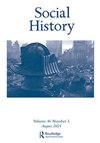中世纪早期的农民所有制、社会流动性和风险规避:一个伊比利亚的案例研究
IF 1.1
1区 历史学
Q1 HISTORY
引用次数: 0
摘要
本文研究了中世纪早期伊比利亚西北部村庄社区的社会和经济动态中一个重要但被忽视的问题:为什么“中等所有者”——即积累了大量土地的农民——在一个制度基础设施尚不完善的时代,聚集了足够大的财产组合,以产生大量盈余?对于这个问题,最常见的答案是追求向上的社会流动;但中型企业主究竟如何获利呢?毕竟,中世纪早期的伊比利亚西北部是一个几乎没有货币化的社会,在这个社会中,潜在的中等所有者不能指望通过出售剩余物品获得硬币支付,因此随着买家的增加,他们会看到自己的选择。那么,为什么要承担扩大农业经营的风险呢?当然,获得土地财富带来了明显的优势,包括象征性的声望和扩大的客户网络。然而,这篇文章表明,只有当我们准备好重新审视重要的史学主题,包括农民的风险厌恶,以及最低生存的文化构成性质,我们才能更好地理解为什么社会流动的农民寻求拥有能够产生大量剩余的土地资源。本文章由计算机程序翻译,如有差异,请以英文原文为准。
Peasant proprietors, social mobility and risk aversion in the early Middle Ages: an Iberian case study
ABSTRACT This article investigates an important but neglected question concerning the social and economic dynamics of village communities in early medieval north-western Iberia: why did ‘medium owners’ – that is, peasants who accumulated significant landed holdings – assemble portfolios of property large enough to produce significant surpluses in an age in which the institutional infrastructure needed to marketise such surpluses was rudimentary? The pursuit of upward social mobility is most commonly posed as the answer to this question; but how exactly did medium owners stand to gain? After all, north-western Iberia in the early Middle Ages was a scarcely monetised society in which would-be medium owners could not expect to be paid in coin for the sale of their surplus and consequently see their options as buyers increase. Why, then, assume the risks involved in expanding one’s farming operation? Certainly, the acquisition of landed wealth brought with it clear advantages, including symbolic prestige and an expanded client network. Yet this article suggests that we can better understand why socially mobile peasants sought to own landed resources capable of producing significant surpluses only if we are prepared to re-examine important historiographical motifs, including peasant risk aversion, and the culturally constituted nature of the subsistence minimum.
求助全文
通过发布文献求助,成功后即可免费获取论文全文。
去求助
来源期刊

Social History
HISTORY-
CiteScore
1.10
自引率
0.00%
发文量
37
期刊介绍:
For more than thirty years, Social History has published scholarly work of consistently high quality, without restrictions of period or geography. Social History is now minded to develop further the scope of the journal in content and to seek further experiment in terms of format. The editorial object remains unchanged - to enable discussion, to provoke argument, and to create space for criticism and scholarship. In recent years the content of Social History has expanded to include a good deal more European and American work as well as, increasingly, work from and about Africa, South Asia and Latin America.
 求助内容:
求助内容: 应助结果提醒方式:
应助结果提醒方式:


